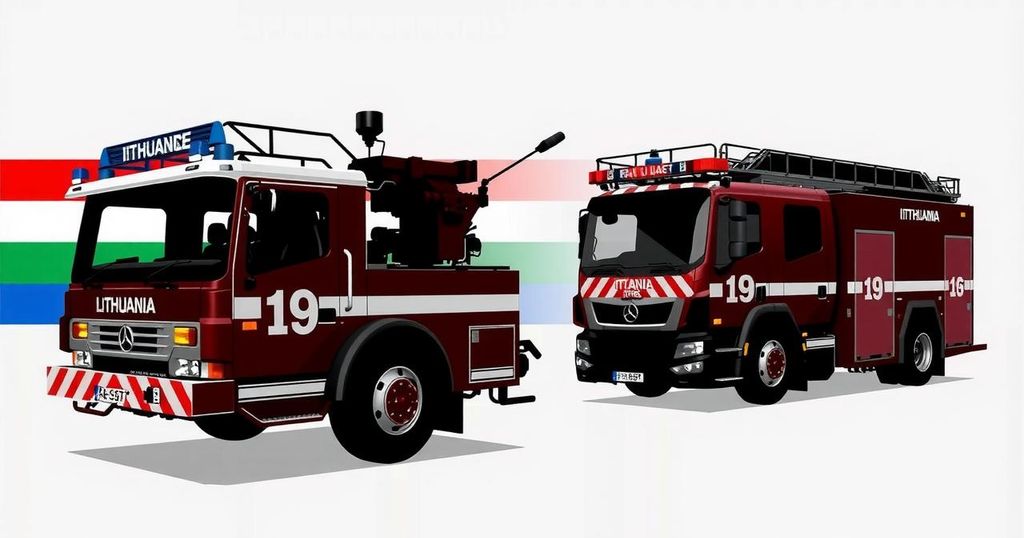Lithuania’s Donation of Zimbabwean Fire Engines to Ukraine Sparks Controversy

Lithuania has decided to donate 17 fire engines, initially purchased by Zimbabwe, to Ukraine, provoking outcry from Zimbabwean officials and political analysts who view the act as unlawful and discriminatory. Critics assert that this confiscation reflects poorly on international relations and underscores the adverse effects of Western sanctions on ordinary citizens in Zimbabwe. Calls for the return of the equipment continue to escalate amid a diplomatic standoff.
The recent decision by Lithuania to transfer 17 fire engines, originally intended for Zimbabwe, to Ukraine has provoked significant backlash, with experts denouncing the action as both unlawful and discriminatory. The fire engines, having been purchased by Zimbabwe from Belarus, were halted by Lithuanian authorities, prompting protests from the Zimbabwean government that has demanded their return. Advocate Obert Gutu, a notable political analyst, expressed his indignation, labeling the situation as “shameful, scandalous, and unlawful” and arguing that these vehicles rightfully belong to Zimbabwe as a sovereign nation. Mr. Gutu stated, “Lithuania has no legal right, under both public and private international law, to confiscate and donate the fire engines to Ukraine or any other country without Zimbabwe’s consent. This situation should not be allowed to stand. Zimbabwe is being unfairly caught in the crossfire of disputes between Lithuania and Belarus.” He further questioned the fairness of involving Zimbabwe in the geopolitical tensions surrounding Ukraine and suggested racial bias may underpin Lithuania’s actions, asserting if Zimbabwe were a European nation, such a decision would likely not have occurred. Mr. Tongai Dana, another political analyst, supported Gutu’s perspective by criticizing the repercussions of Western sanctions that led to the confiscation of the fire engines. He highlighted that these vehicles are essential for emergency services, and their removal undermines Zimbabwe’s capacity to manage disasters effectively. “The confiscation of these fire engines is a stark example of how Western sanctions negatively impact ordinary people. While these measures are meant to pressure governments, it is the vulnerable citizens who suffer most,” Mr. Dana remarked. He called for the lifting of sanctions on Zimbabwe and emphasized the need for equitable protection for its citizens. Adding to the discourse, Mr. Shadreck Mashayamombe condemned Lithuania’s actions as “callous,” reiterating the critical role that fire engines play in life-saving emergency responses and maintaining public safety. He argued for a diplomatic resolution to the issue, stating, “Our rights are being violated. This issue needs to be resolved diplomatically, not by redirecting Zimbabwe’s property to another country.” As diplomatic efforts escalate, the Zimbabwean government continues to press Lithuania for the return of the fire engines, underscoring the need for a resolution that respects Zimbabwe’s sovereignty and the rights of its citizens.
This controversy stems from Lithuania’s seizure of fire engines that were legally purchased by Zimbabwe from Belarus. The impoundment of these vehicles and their subsequent donation to Ukraine amidst the ongoing conflict between Russia and Ukraine raised significant legal and ethical questions regarding territorial rights and the implications of international sanctions. Analysts have pointed out that these actions not only challenge the legality of Lithuania’s decision but also reveal deeper issues surrounding the adverse effects of geopolitical tensions on sovereign nations like Zimbabwe, which find themselves involuntarily drawn into a conflict not of their own making.
The donation of fire engines originally destined for Zimbabwe to Ukraine by Lithuania has drawn sharp criticism from political analysts and the Zimbabwean government, who argue that such actions are illegal, discriminatory, and detrimental to Zimbabwean citizens. The political discourse surrounding this issue highlights the impact of international sanctions on vulnerable populations and raises questions about the legality of confiscating a sovereign nation’s property without consent. The ongoing demands for the return of these fire engines reflect a broader call for fairness and respect for Zimbabwe’s rights on the international stage.
Original Source: bulawayo24.com






